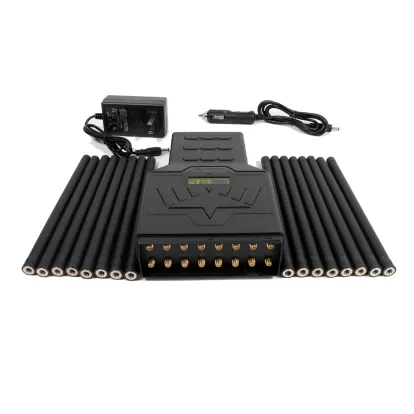Cellphone jammers alone do not suffice to impede communication from incarcerated individuals
The existence of cellphone jammers within the nation's prisons does not completely impede incarcerated criminals from engaging in communication with individuals on the outside.
This is the view of senior prison officials who tell the Sunday Express that even though the signal blockers (which they say are operational) are used to block signals from cellphones within the prisons, other interception technologies are needed for the system to be effective.
Cellphone jammers are currently employed, however, their optimal effectiveness is achieved when combined with other technologies like Wi-Fi jammers. This correlation has been observed in different jurisdictions, but its proper utilization is yet to be fully embraced here.

Within the prison, there will be individuals who have cellphones and tablets, yet they will be unable to make regular phone calls. However, they can make use of the phone's data or, if they have access to a hot-spot device or a Wi-Fi box, they will have the capability to make calls via social media applications such as WhatsApp, Facebook, and Instagram. Consequently, the challenge of maintaining communication with the outside world persists. Communication continues to occur.
“In other jurisdictions, you will see the cellphone jammers being used with other interception devices to determine the frequencies used by these devices, and then target those specific frequencies. If this is not done, then it’s almost like spinning top in mud,” a senior source in the Prison Service explained yesterday.
Additionally, the Sunday Express has disclosed that the jammers, despite being used and operated within the Prison Service, are actually managed by a third party.
Regarding inquiries about the functionality of the cellphone jammers, Acting Prisons Commissioner Deopersad Ramoutar chose not to provide a straightforward response. He justified his decision by stating that this information is privileged and lies beyond the scope of the Prison Service's jurisdiction.
As per the Sunday Express, other senior officials have confirmed their continued operational status.
Among the items confiscated during a search at the Maximum Security Prison in Arouca, a Wi-Fi box was discovered and seized.
The officers received intelligence that guided them to the cells located in the B Division of the prison.
Through meticulous search operations, the authorities were able to locate and seize a bag in a particular cell near the toilet area. This bag was found to contain 53 grammes of marijuana, along with cellphones and the Wi-Fi box.
Inside another compartment, the authorities discovered and confiscated a bag that contained 104 packs of cigarettes and marijuana, with a combined weight of 241 grams.
Two prisoners declared that the seized items belonged to them.
Prison officers conveyed their concerns on Friday regarding the deployment of drones over correctional facilities. A senior officer underscored the significance of addressing this matter promptly, describing it as an imminent threat that requires attention.
The presence of an uncaught drone, even a solitary one, can give rise to an extremely grave situation. This drone has the potential to release knives or even guns, posing a significant threat. While our seizures have thus far comprised contraband items such as cigarettes, marijuana, phones, and chargers, the failure to apprehend even a single drone can lead to a highly dangerous scenario within the prison and for the nation.
Ramoutar emphasized that the Prison Service has duly acknowledged a rise in the number of drones being deployed around prisons, especially in the last year, and has promptly responded to the situation.
With the aid of various branches within the National Security portfolio, he stated that the majority of the objects that were thrown over prison walls were seized before they could reach the prisoners.


Comments
Post a Comment